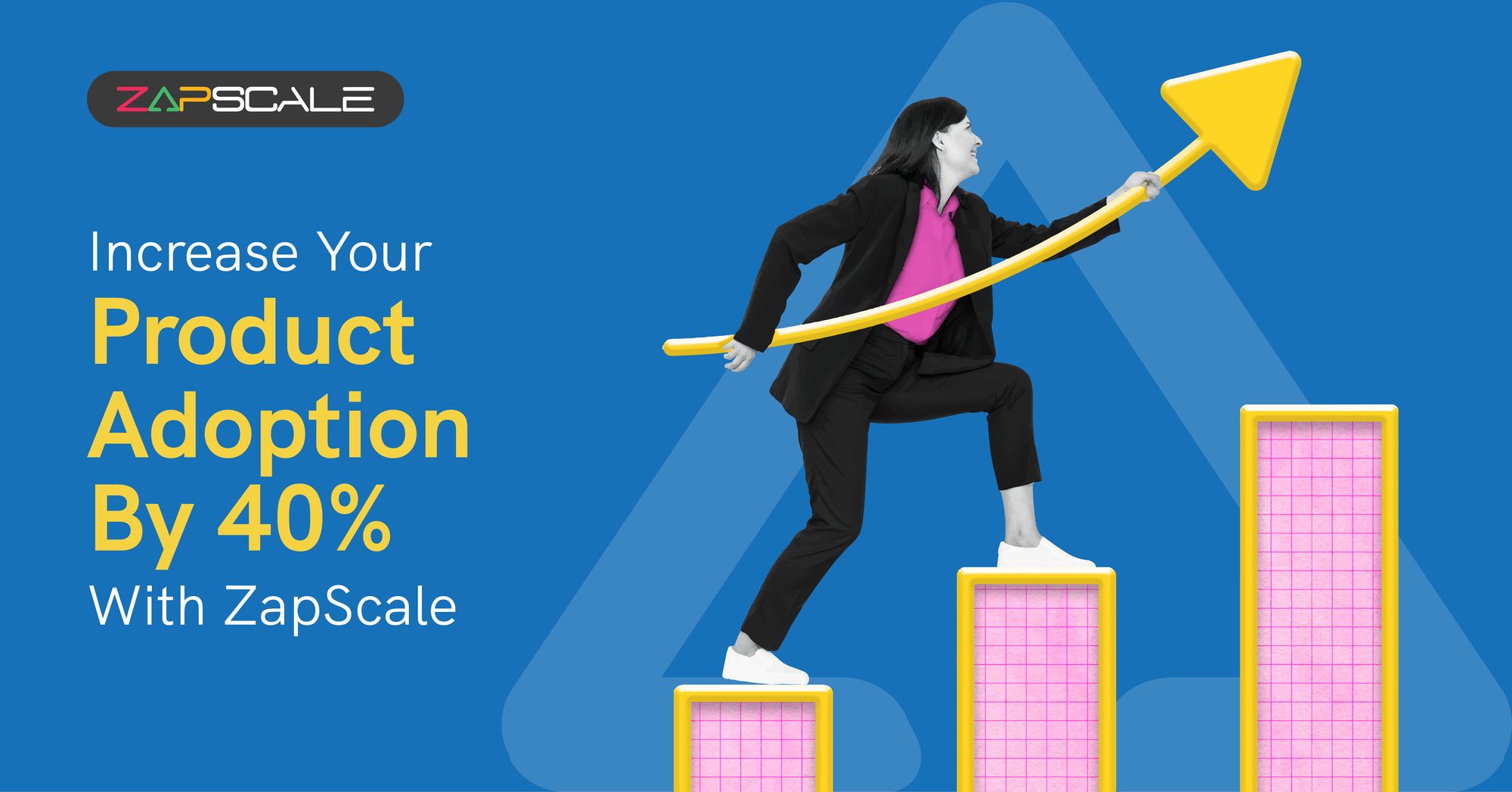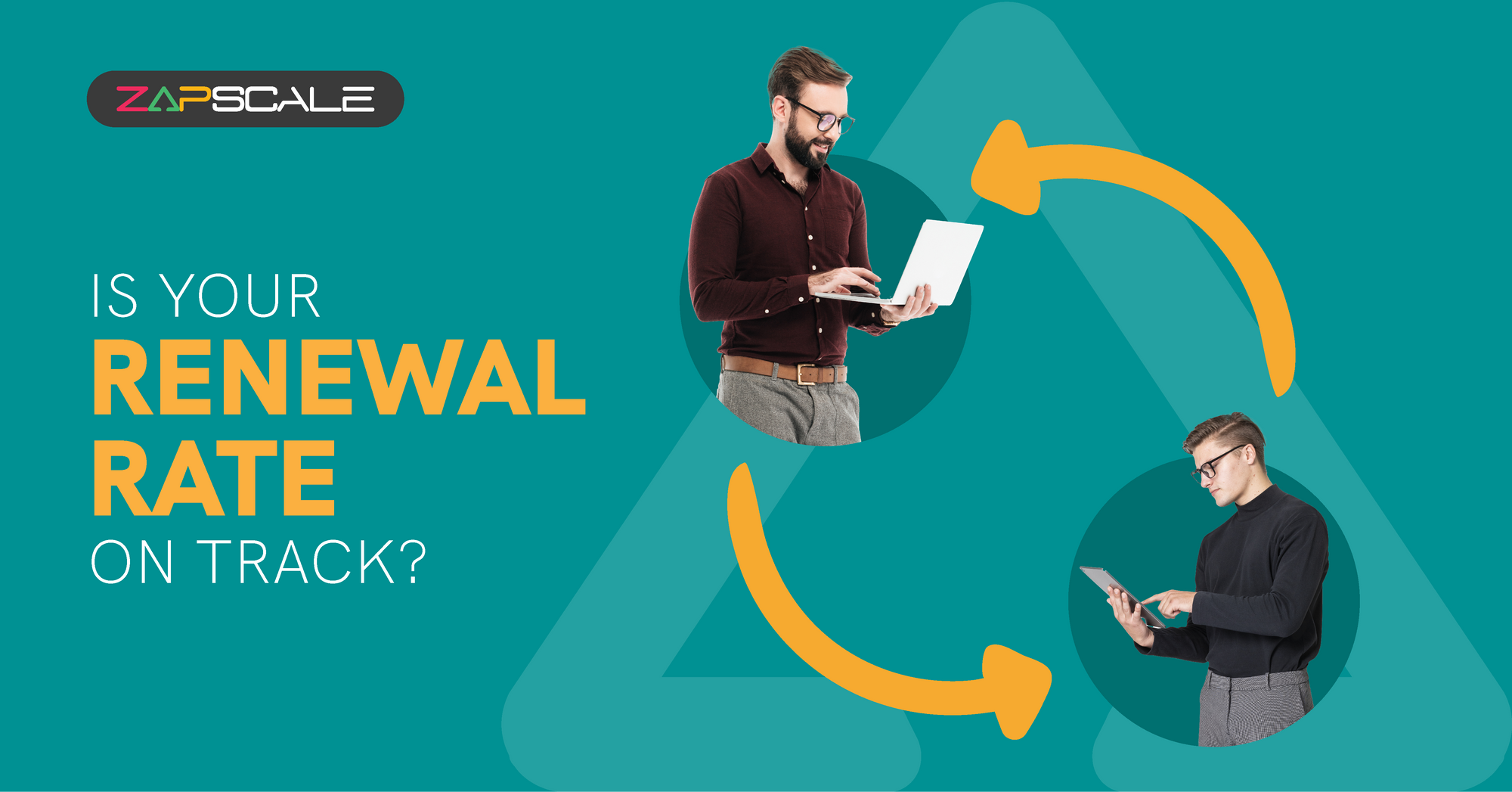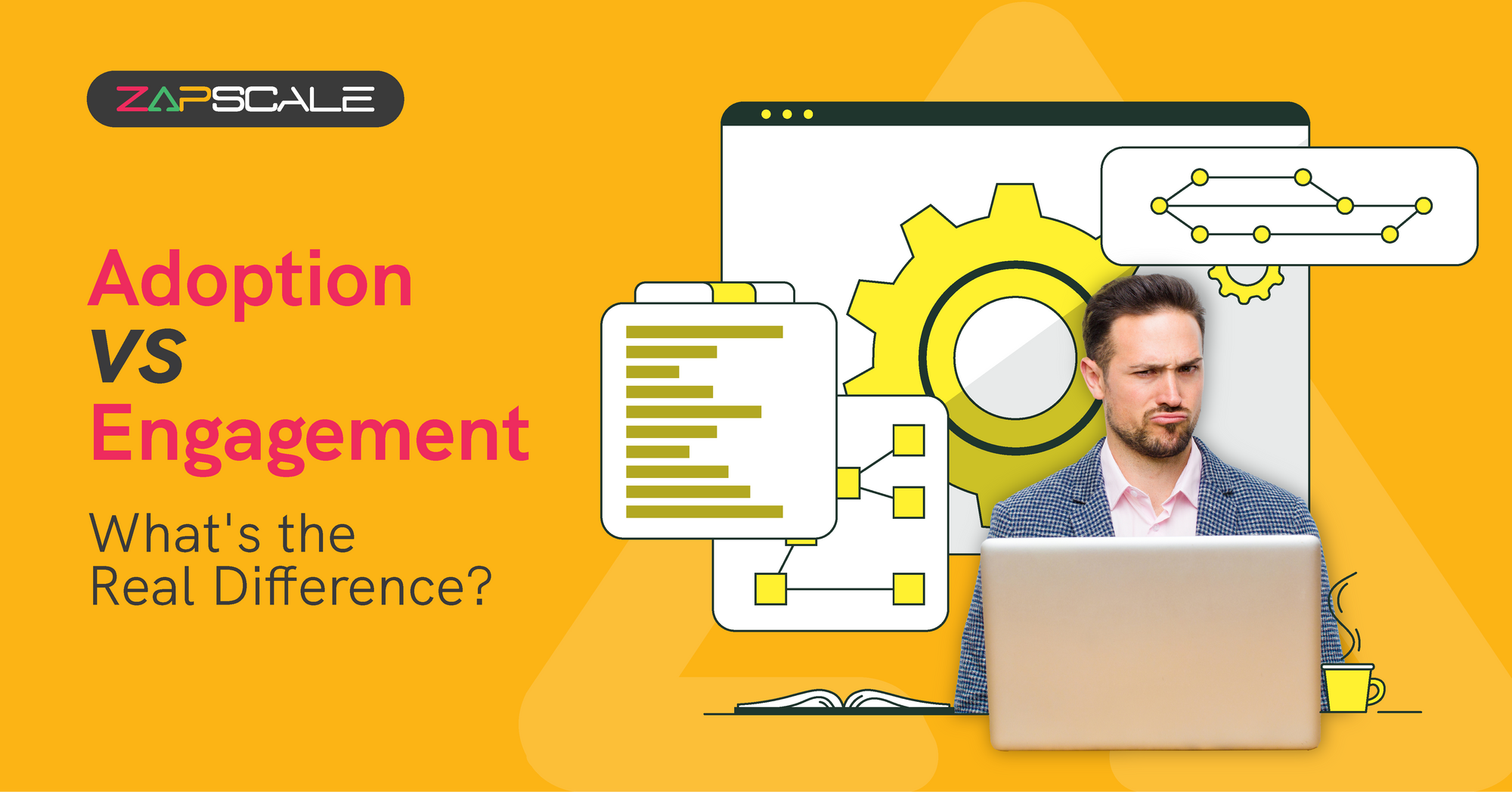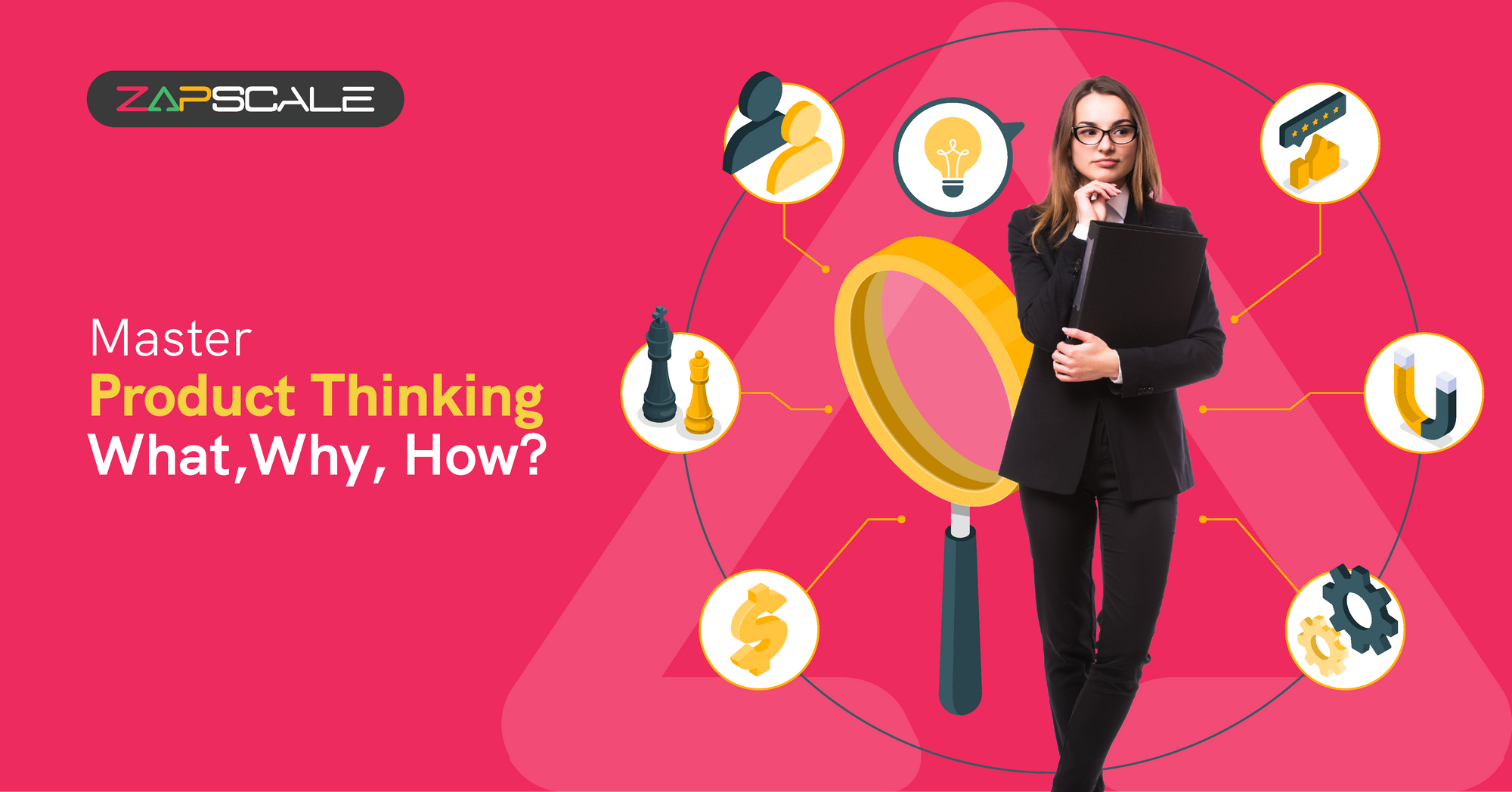CATEGORY > Customer Retention
What Is A Customer Retention Manager?

A Day In The Life Of A Customer Retention Manager
A high customer retention rate shows a loyal customer base.
So, what is a customer retention manager?
As the name suggests, a customer retention manager keeps customers satisfied so that they continue to become loyal customers of the brand for a longer period.
Who Are Customer Retention Managers?
Customer retention managers oversee processes and KPIs directly associated with customer retention, loyalty, and turnover.
Their major responsibility is to guarantee that customers get the most out of the product or service, allowing them to meet their objectives and increase customer loyalty.
They collaborate with the customer success team to develop and implement data-driven churn-reduction practices.

This entails interacting with customers throughout their lifecycle, from initial contact to continuing support, to assure customer satisfaction and rapidly address difficulties.
Apart from simply retaining clients, the ultimate goal of a customer retention manager is to cultivate deep loyalty and establish strong, long-term relationships that characterize the brand.
The emphasis is on developing meaningful customer relationships to drive long-term company success and improve overall brand reputation.
The Essential Role Of A Customer Retention Manager In SaaS
In an unpredictable yet promising SaaS environment, a customer retention manager is an enabler of customer success and business sustainability.
Let’s learn how these individuals achieve the same.
1. Ensure Higher Customer Lifetime Value
Beyond just retaining customers, a customer retention manager’s primary intent is to maximize the customer's lifetime value. This includes upselling or cross-selling new services to boost the value customers receive from the product and ensure their satisfaction over time.
2. Monitor Key Metrics
Effective retention managers keep track of critical metrics like retention rates, renewal rates, and customer satisfaction scores. They utilize these indicators to monitor the health of their customer base and track the effectiveness of retention initiatives over time.
3. Product Enhancement
SaaS solutions and customer requirements are ever-evolving.
Retention managers must stay updated on current market trends, competitor offerings, and changes in customer preferences. They then change their strategy to respond to shifting challenges and opportunities.
Core Responsibilities & Tasks
A customer retention manager gets to wear multiple hats on a single day!
Let’s get a sneak peek of a customer retention manager’s job description.
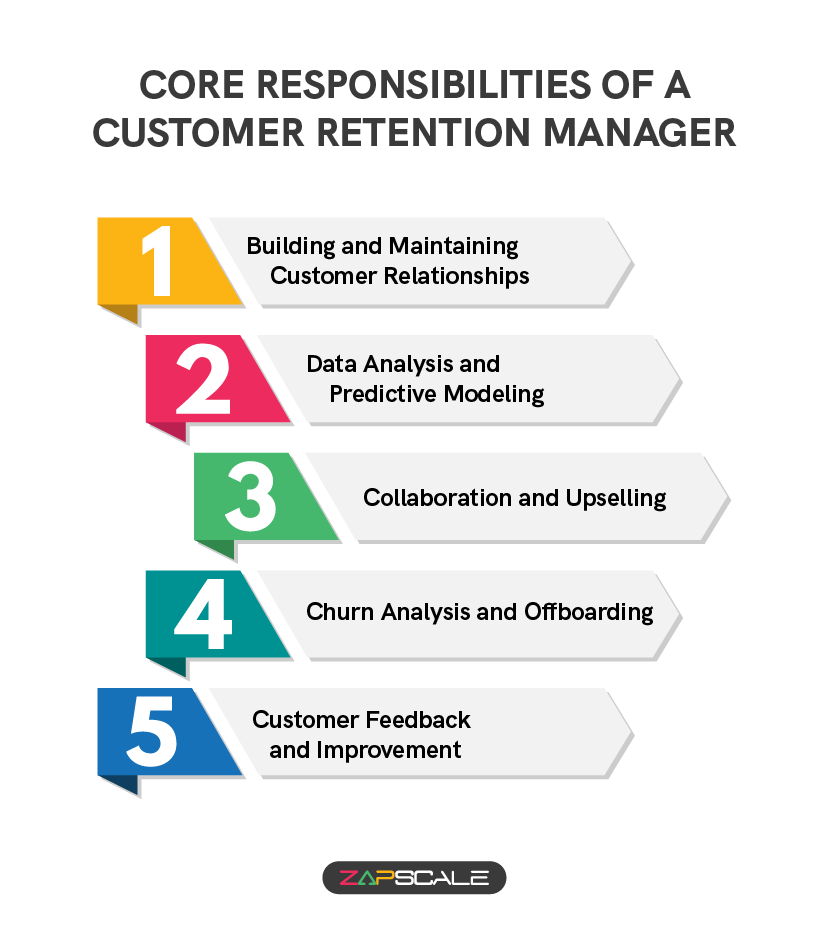
1. Building And Maintaining Customer Relationships
- Comprehending customer's wants, preferences, and pain points.
- Developing great connections based on trust and empathy.
2. Data Analysis And Predictive Modeling
- Collect and analyze customer data to discover trends and patterns.
- Use insights to better predict customer demands and improve retention methods.
3. Collaboration And Upselling
- Collaborate closely with expansion and upsell managers to create offers that solve customer problems while increasing upsell and cross-sell opportunities.
4. Churn Analysis And Offboarding
- Analyze turnover reasons and create an offboarding process and checklist.
- Conduct offboarding interviews to learn why customers are departing and identify areas for improvement.
5. Customer Feedback And Improvement
- Gather and evaluate customer feedback to improve products and services.
- Conduct customer interviews and surveys to better understand customer sentiment.
- Collaborate with cross-functional teams to initiate customer-centric improvements.
Why Customer Retention Managers Matter?
Customer retention managers are particularly significant to customer-centric businesses as they take “customer pleasure” seriously.
Read below to discover the benefits of having a customer retention manager on board.
1. Revenue Boosters
New customers are expensive to find.
Customer retention managers prioritize keeping current customers happy and loyal.
Customer retention managers contribute significantly to revenue growth by enhancing CLV and reducing attrition.
Further, they provide a consistent income stream through renewals and repeat purchases, which is critical for financial stability and growth.
2. Strategic Partners
Customer retention managers work collaboratively with all departments to ensure a customer-centric strategy throughout the firm.
They work as strategic partners to drive business success by synchronizing plans with sales, marketing, product development, and customer service teams.
This relationship assures consistent value delivery and contributes to the company's prosperity.
3. Insightful Decision Makers
They analyze data to determine what motivates customer behavior and preferences.
This data-driven strategy directs initiatives for improving customer retention and churn management while enhancing the overall customer journey.
4. Business Growth Enabler
Customer retention is the foundation for long-term business growth.
CRMs aim to improve customer pleasure and loyalty, both of which are crucial to long-term company success.
CRMs promote ongoing growth objectives and boost an organization's market position by cultivating relationships and providing great customer experiences.
Essential Qualities Of A Customer Retention Manager
Being a customer retention manager is no easy feat.
Here is a list of skills that every successful customer retention manager must possess.
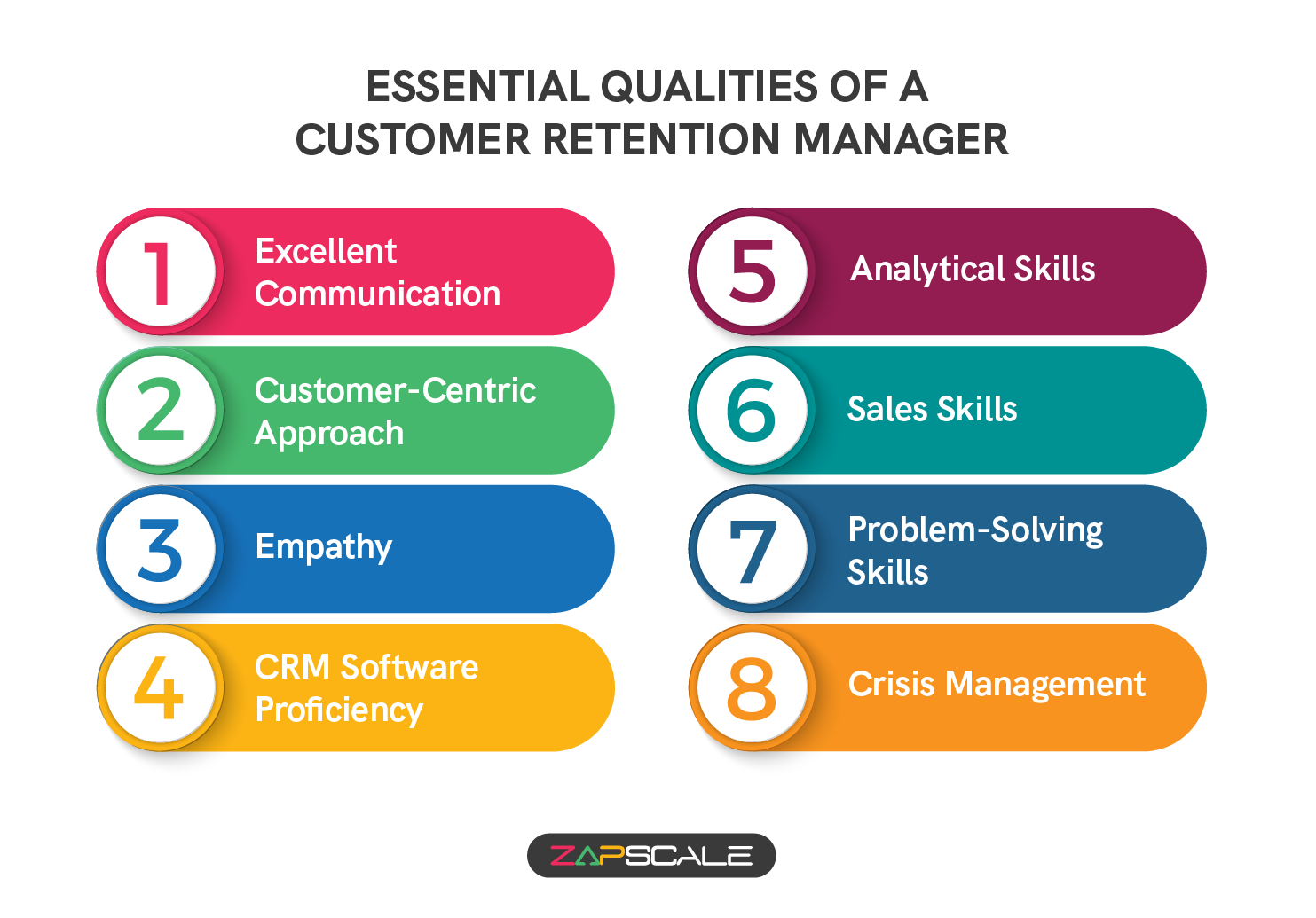
1. Excellent Communication
Clear and effective communication is essential in determining customer requirements and addressing difficulties quickly.
2. Customer-Centric Approach
Keeping the requirements of customers in mind throughout all interactions and decisions.
3. Empathy
Ability to empathize with customers’ concerns and deliver personalized support accordingly.
4. CRM Software Proficiency
Ability to track and manage customer interactions via customer relationship management solutions.
5. Analytical Skills
Analyze customer data to uncover patterns and possibilities for better decision-making.
6. Sales Skills
Expert in upselling and cross-selling techniques to increase customer lifetime value and revenue growth.
7. Problem-Solving Skills
Ability to solve customer issues and provide solutions that satisfy their requirements.
8. Crisis Management
Tackle high-pressure situations or customer escalations calmly and professionally.
How Much Customer Retention Manager Earn?
Let’s uncover what an average yearly paycheck looks like for customer retention managers across the globe.
- India: ₹5L - ₹15.0L
- United States: $81,875 to $105,712
- United Kingdom: £3,455 to £16,345.
- Japan: ¥70.0L to ¥1.2Cr
- United Arab Emirates: AED 47k - AED 380k
Source: glassdoor.com, salary.com, and www.payscale.com
Customer Success Manager Vs. Customer Retention Manager
Although both customer success managers and customer retention managers deal with improving customer satisfaction, they slightly differ in countless terms as mentioned below.
1. Primary Focus
a. Customer Success Manager
Primarily focuses on ensuring customers achieve their desired outcomes using the product or service, providing support and guidance throughout their journey.
b. Customer Retention Manager
Concentrates on strategies and actions to prevent customer churn, aiming to keep existing customers satisfied and engaged.
2. Daily Activities
a. Customer Success Manager
Onboarding new customers, conducting product training, identifying expansion opportunities, and building customer relationships.
b. Customer Retention Manager
Analyzing customer data, addressing customer issues, implementing retention strategies, and managing customer renewals.
3. Customer Interaction
a. Customer Success Manager
Engages with customers proactively to offer support, training, and solutions to maximize their success with the product.
b. Customer Retention Manager
Often interacts with customers reactively, especially when identifying and addressing issues that could lead to churn.
4. Key Metrics
a. Customer Success Manager
Measures success through customer satisfaction scores (CSAT), net promoter scores (NPS), product adoption rates, and overall customer success.
b. Customer Retention Manager
Tracks metrics like churn rate, renewal rates, retention rate, and revenue loss from churned customers.
Maximizing B2B SaaS Profits with an Expert Customer Retention Manager
A seasoned CRM is indeed an asset to a B2B SaaS organization.
Read below to learn how.
1. Advanced Churn Prediction
CRMs can anticipate possible churn using advanced analytics and predictive modeling. This enables early intervention with specific actions to solve customer concerns, lowering churn and stabilizing revenue.
2. Customer Health Evaluation
With a robust health scoring system, a customer retention manager can gauge the overall status of customer accounts.
By assessing variables such as usage frequency, support inquiries, and engagement levels, they can prioritize their attention on at-risk clients and take preventative measures.
3. Tailored Retention Programs
CRMs create and implement customized retention campaigns for distinct customer categories.
These personalized programs address specific requirements and problem points, resulting in more effective retention efforts and increased revenues.
The Future Of Customer Retention Managers
A customer retention manager’s job description is about to encounter pretty cool changes due to the onset of technology.
Let’s figure out what the future holds for customer retention managers regarding customer retention and churn management.
1. Increased Use Of AI And Automation
CRMs will increasingly utilize AI and automation to evaluate customer data and forecast churn. Automated systems will handle basic tasks such as sending follow-up emails or notifications, freeing CRMs to concentrate on more strategic areas of retention.
2. Enhanced Personalization
The role will entail providing highly tailored customer experiences. CRMs will use advanced data analytics to personalize messaging, offers, and support for fostering customer happiness and loyalty.
3. Focus On Customer Empowerment Tools
CRMs will encourage and support the use of self-service tools and resources like extensive knowledge bases, community forums, etc. to allow customers to deal with their basic requirements on their own.
FAQs
1. What are some common tools utilized by Customer Retention Managers?
CRM software, customer feedback platforms, data analytics tools, and marketing automation systems are some common CRM tools.
2. What are retention programs?
Programs created by CRMs to keep customers engaged - loyalty rewards, exclusive content, etc.
3. How do CRMs manage customer renewals?
By contacting customers before renewal deadlines, negotiating contracts, and resolving any issues to ensure customers continue their subscriptions.
ABOUT THE AUTHOR
Popular from Customer Retention
Quality Content,
Straight To Your Inbox!
Subscribe for the latest blogs, podcasts, webinars, and events!

Write a Blog
If you have experience in CS and
a flair for writing, we’d love to
feature you.
Write to us on
hello@zapscale.com
